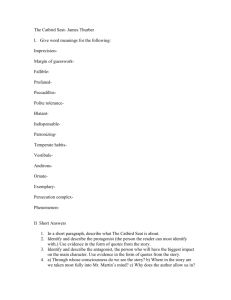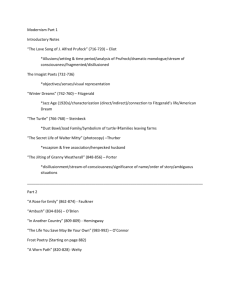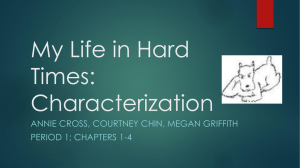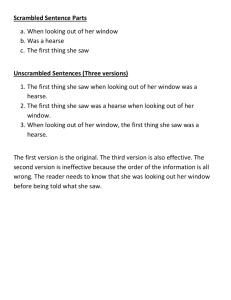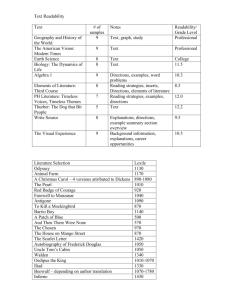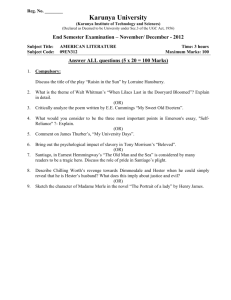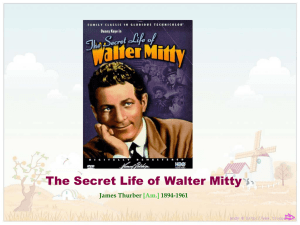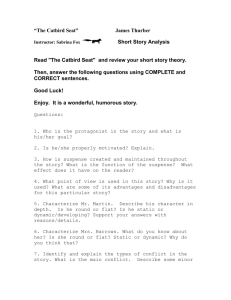James Thurber
advertisement
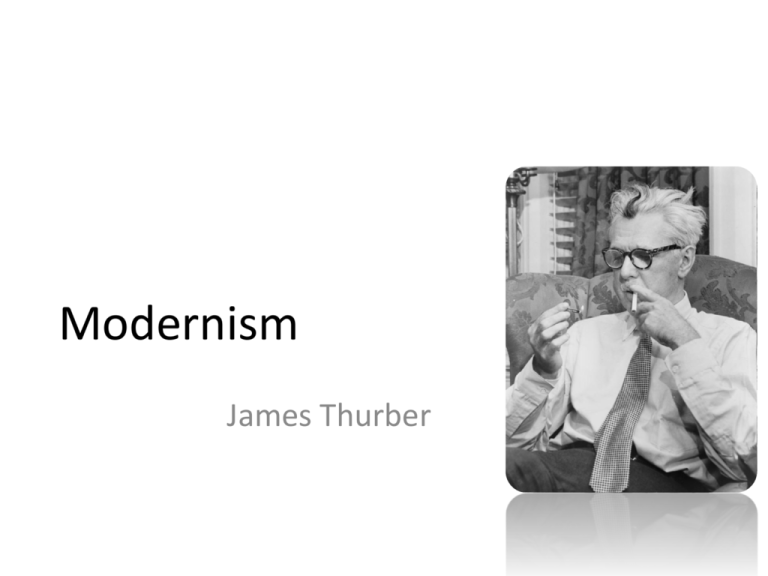
Modernism James Thurber James thurber • Full Name: James Grover Thurber • Born December 8, 1894 in Columbus, Ohio • Died November 2, 1961 in New York City, New York (Age 66) James thurber • An American author, cartoonist and celebrated wit • Best known for his cartoons and short stories, published mainly in The New Yorker magazine then collected in his numerous books. • One of the most popular humorists of his time, Thurber celebrated the comic frustrations and eccentricities of ordinary people. James thurber • Parents: Charles L. Thurber and Mary Agnes (Mame) Fisher Thurber • Siblings: Two brothers—William and Robert • Both of his parents greatly influenced his work. His father is said to have been the inspiration for the small, timid protagonist typical of many of his stories. Thurber described his mother as a "born comedian“ • Once, while playing a game of William Tell, his brother shot James in the eye with an arrow, and Thurber lost that eye. This injury left him unable to participate in sports and activities and would later cause him to be almost entirely blind. James thurber Because his childhood became limited due to his eye injury, Thurber developed a creative imagination, which he shared in his writings. Neurologist V.S. Ramachandran suggests Thurber's imagination may be partly explained by Charles Bonnet syndrome, a neurological condition that causes complex visual hallucinations in otherwise mentally healthy people who have suffered some level of visual loss. James thurber • • • From 1918 to 1920, at the close of World War I, Thurber worked as a code clerk for the Department of State, first in Washington, D.C., and then at the American Embassy in Paris, France. After this, Thurber returned to Columbus, where he began his writing career as a reporter for the Columbus Dispatch from 1921 to 1924. During this time, he reviewed current books, films, and plays in a weekly column. James thurber • Thurber also wrote for the Chicago Tribune and other newspapers when he returned to Paris • In 1925, he moved to Greenwich Village in New York City, getting a job as a reporter for the New York Evening Post • He joined the staff of The New Yorker in 1927 as editor James thurber • Thurber’s career as a cartoonist began in 1930 with the help of his friend and fellow New Yorker contributor E.B. White. • When White found some of Thurber's drawings in a trash can, he submitted them for publication. • Thurber would contribute both his writings and his drawings to The New Yorker until the 1950s. James thurber • His best-known short stories are "The Dog That Bit People" and "The Night the Bed Fell" • Among his other classics are "The Secret Life of Walter Mitty,“ "The Catbird Seat," "A Couple of Hamburgers," & "The Greatest Man in the World“ • Thurber also wrote 26 novels—anthologies, children’s stories, and drama plays. • In addition to his other fiction, Thurber wrote over 75 fables • Thurber's prose for The New Yorker and other venues also included numerous humorous essays. James thurber • Many of his short stories are humorous fictional memoirs from his life, but he also wrote darker material. • Together with other New Yorker writers (like Robert Benchley, E.B. White, Frank Sullivan, and Ogden Nash), Thurber created a rich tradition of modern American humor. • Like many humorists, Thurber returned to his favorite themes—In Thurber-Land, the men are often sad, bewildered, and inept; the women are fierce and determined; and their dogs are indifferent to men a women alike, and are immersed in a fantasy world of their own. • Thurber was a dedicated craftsman, who rewrote his works as many as 25 times. James thurber • Many readers have recognized that under Thurber’s humor, there is a vein of melancholy that throws the humor in relief and gives it a sharper edge. • The poet T.S. Eliot called Thurber’s work “a form of humor which is also a way of saying something serious.” James Thurber Keith Olbermann reading “The Catbird Seat” Part 1 Part 2 Part 3 The Unicorn in the Garden The Last Flower Portrayal of characters Male sad, bewildered, inept immersed in fantasy Female fierce and determined unimaginative Humor • Reversal-Flip the script---woman bested by the ineptitude of the man • Incongruity • Idiomatic Expressions The Unicorn in the Garden • How does the cartoon illustrate Thurber’s humor? What techniques does he use? Edmodo 2: Watch The Last Flower a parable in pictures
